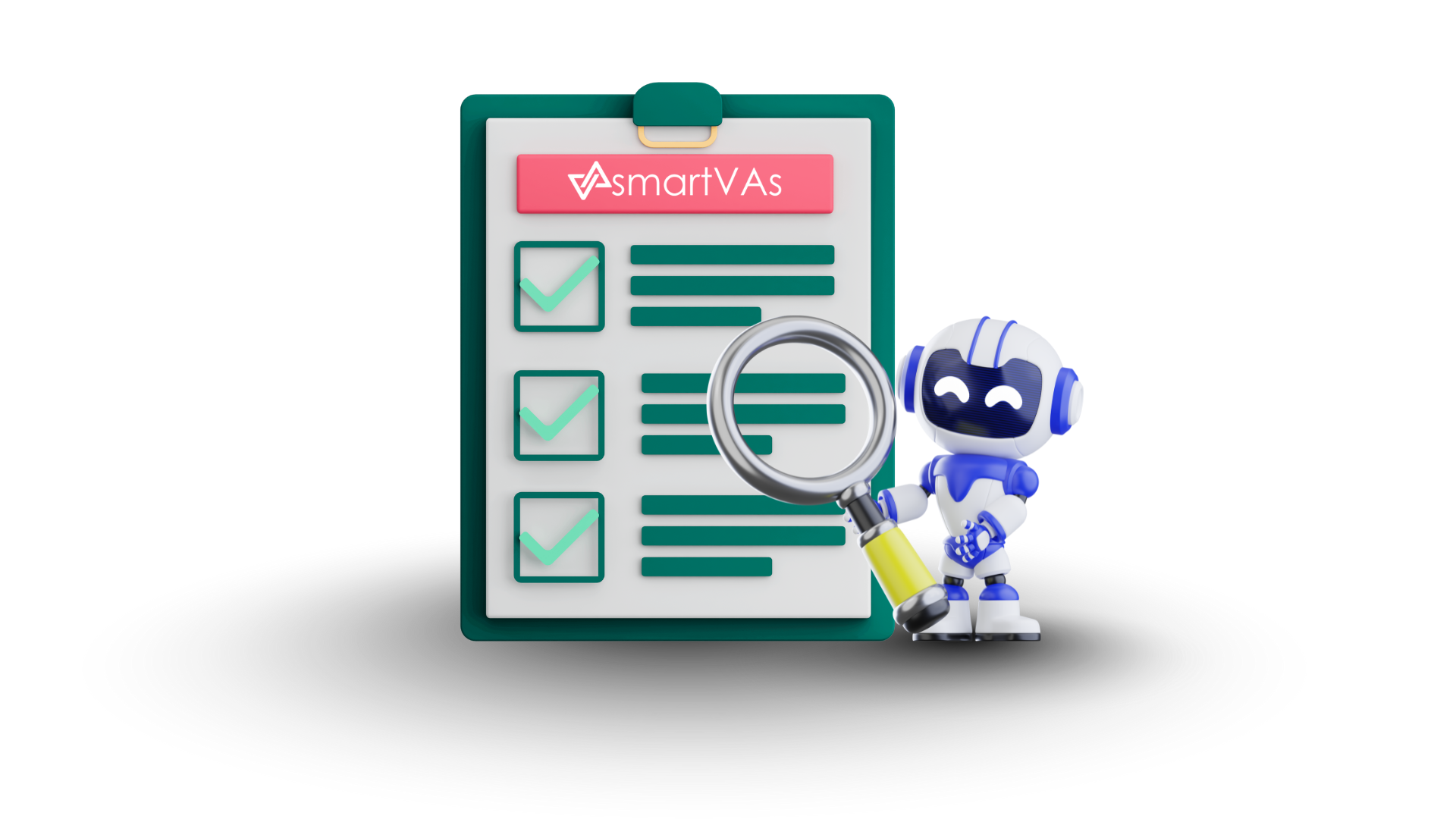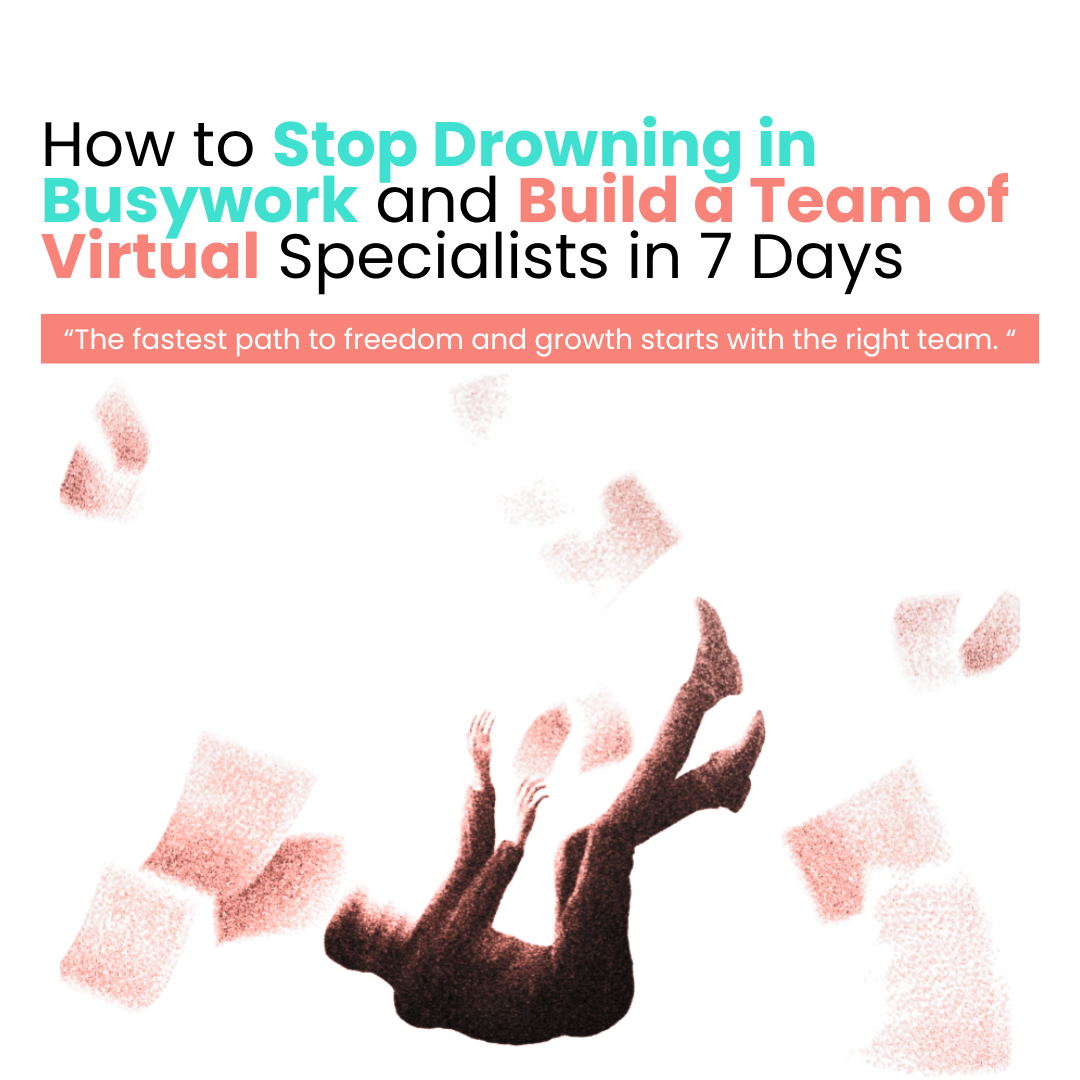30 Questions to Ask a Bookkeeper Before Hiring Them
Many business owners make a dangerous assumption: that any person with “bookkeeper” on a resume can handle the books well. That error leads to costly mistakes, missed taxes, and sleepless nights. Clients deserve someone sharp, reliable, and clear. A bookkeeper who hides errors or mismanages finances becomes a liability, quickly. To avoid that hazard, every business owner should carry a list of questions to ask a bookkeeper, not vague queries, but specific, practical ones.
This blog outlines thirty precise questions to ask a bookkeeper before you hire them. It also explains why each question matters. Laypeople will understand every term. After that, you will see a section on choosing a good bookkeeper, and a final note about Smart VAs, where we provide a team of virtual assistants including bookkeeping pros. At the end, a “Frequently Asked Questions” section clears up common doubts.
Related Article: Bookkeeping Assistant
STOP MANAGING TASKS. START LEADING.
SMART Delegation helps you reclaim your role as CEO while building a stronger team.
30 Questions to Ask a Bookkeeper Before You Hire
Below are thirty vital questions to ask when hiring a bookkeeper. Each question gives insight into the candidate’s experience, process, and reliability. Use them during interviews or discovery calls to identify the right professional for your business.
1. What exact services do you provide in bookkeeping?
This question clarifies what the bookkeeper will actually handle—such as transaction recording, payroll, or financial reporting. Some bookkeepers offer only basic entries, while others provide comprehensive financial management. Knowing this ensures that your expectations match their services. It also helps you compare scope and pricing across candidates.
2. Do you work as a remote bookkeeper or in person?
The setup affects communication and workflow. A remote bookkeeper uses digital tools and cloud platforms to manage accounts, which offers flexibility and often lower costs. Asking this early helps determine compatibility with your business operations. It also reveals their level of comfort with virtual collaboration.
3. How many clients do you currently serve?
This shows how busy the bookkeeper is and how much attention they can give your business. Too many clients may lead to divided focus. A manageable client load indicates they can provide consistent service. It’s also a good way to gauge their organizational skills.
4. How many hours per week or month will you allocate to this client’s work?
Time commitment ensures that your bookkeeping won’t be rushed or neglected. It’s important to know how much time they can dedicate to tasks, especially during peak periods. A clear schedule helps you plan accordingly. This also prevents misunderstandings about turnaround times.
5. Are you familiar with the accounting software my business uses (for example, QuickBooks, Xero, or others)?
Bookkeepers should be fluent in your chosen platform to avoid delays. This question confirms their proficiency and experience level. If they have certifications or special training, that adds value. Familiarity with software also reduces onboarding time.
6. If you need to learn our software, how long will that take?
Some bookkeepers may need to adjust to your tools or systems. Asking this helps you estimate the learning curve. It also reveals their adaptability and willingness to learn. A confident response shows they can integrate smoothly into your workflow.
7. Can you prepare financial statements such as income statements, balance sheets, and cash flow reports?
Comprehensive reporting shows professionalism. These reports summarize financial health and guide decision-making. Not all bookkeepers prepare them, so ask before hiring. Their ability to produce clear statements ensures better business insight.
8. How often will you send those statements?
Frequency of updates affects how current your financial data stays. Monthly or quarterly reporting is typical. Consistent delivery helps you track performance and make timely decisions. It also builds accountability and transparency.
9. Will you provide a trial period to test your work?
A trial period allows you to assess compatibility before committing. It shows confidence in their service quality. During this time, you can evaluate accuracy, communication, and responsiveness. It also protects you from long-term commitments that don’t work out.
10. Can I see samples of reports you created (with sensitive data removed)?
Samples show their formatting style, clarity, and attention to detail. This gives you an idea of what your future reports might look like. It also verifies their experience with real clients. Always ensure they protect confidentiality by removing personal information.
11. Do you maintain separate records for each client to avoid mixing data?
Proper segregation of client data is a mark of professionalism. It prevents errors and keeps your financial information secure. This question highlights their organizational discipline. Clear boundaries between client files also ensure compliance with privacy regulations.
12. How do you ensure data security and confidentiality?
Financial records contain sensitive details. Asking this ensures the bookkeeper uses secure systems, encrypted storage, and confidentiality agreements. Security should be part of their daily routine, not an afterthought. A trustworthy bookkeeper will clearly explain their protocols.
13. What internal controls do you use to catch errors or fraud?
Internal checks reduce risk and maintain accuracy. Ask how they review entries, reconcile balances, and double-check transactions. This reflects their commitment to integrity and precision. Reliable bookkeepers have set systems for detecting and correcting mistakes.
14. How do you handle corrections to past records if you discover mistakes?
Errors happen, but how they are fixed reveals professionalism. A good bookkeeper will document corrections clearly and communicate them promptly. They should avoid deleting or hiding past entries. Transparency in corrections keeps your records credible.
15. Who will be your backup if you are unavailable (vacation, illness)?
Continuity matters, especially during critical times like tax season. Knowing there’s a backup plan ensures work will continue without delay. This is essential for small businesses that depend on regular updates. Backup arrangements also show reliability.
16. Have you ever worked with a bookkeeping virtual assistant team or system?
Experience with collaborative setups is valuable. A bookkeeping virtual assistant environment means multiple professionals may share tasks to improve efficiency. Ask how they communicate and coordinate within such teams. Their experience with this structure helps ensure smooth workflows.
17. How do you handle communication and updates (email, calls, shared dashboards)?
Regular updates build trust and prevent confusion. This question clarifies their preferred methods and response times. Clear communication avoids missed deadlines or misunderstandings. It also sets expectations for feedback and reporting frequency.
18. How do you bill—hourly, fixed fee, or retainer?
Billing methods affect budgeting. Fixed fees offer predictability, while hourly billing suits variable workloads. Understanding their pricing structure helps you avoid hidden costs. This also sets the foundation for a transparent partnership.
19. What is your policy for extra or unexpected tasks?
Sometimes new tasks arise outside of regular duties. Ask how they handle those situations and what additional charges may apply. A clear policy prevents billing disputes later. It also shows their flexibility and fairness.
20. How do you track your time and tasks for each client?
Time tracking ensures accountability and transparency. Some use software or manual logs to record hours spent on tasks. This question helps you understand how progress is monitored. A well-organized system signals professionalism and efficiency.
21. What experience do you have in my industry (for example, retail, services, manufacturing)?
Industry knowledge speeds up the learning process. A bookkeeper who understands your field already knows common expenses, tax categories, and reporting standards. That experience minimizes errors. It also means they can offer relevant insights.
22. How do you handle payroll and tax filings or coordination with accountants?
Payroll and taxes are sensitive areas that require accuracy. Ask about their workflow for these tasks to avoid compliance issues. Coordination with accountants ensures that your books match tax filings. A reliable bookkeeper will explain their process clearly.
23. How do you reconcile bank statements and credit cards?
Reconciliation ensures all transactions match your financial records. A bookkeeper should perform this regularly to catch missing or duplicate entries. Ask for details about their method and frequency. This question helps confirm their attention to accuracy.
24. Do you handle accounts payable and receivable?
Managing payments and collections is often part of bookkeeping. Clarify if they will track due dates, send invoices, or process payments. Handling these tasks efficiently improves cash flow. It also reduces late fees and client disputes.
25. Can you help with budgets, forecasts, or cash flow planning?
Strategic input adds real value to bookkeeping. Some professionals assist with planning and projections. This question helps you identify candidates who can go beyond basic recordkeeping. A bookkeeper skilled in budgeting supports better decision-making.
26. How do you manage receipts, invoices, and document storage?
Proper organization of documents saves time and prevents errors. Ask what systems or tools they use to store digital or physical records. Cloud storage solutions are common among modern bookkeepers. This ensures easy access and compliance with recordkeeping rules.
27. Can you help if my business grows and complexity increases?
As a company expands, bookkeeping demands change. You need someone who can scale with you. Ask if they can adapt their systems or add support staff when needed. Flexibility ensures that your financial management remains consistent as you grow.
28. Are you open to being part of a team of virtual assistants that supports my business?
Collaboration enhances productivity. Being part of a team of virtual assistants means your bookkeeper will coordinate with other specialists such as social media, admin, or marketing VAs. This setup creates a cohesive support structure. Openness to teamwork signals reliability and adaptability.
29. How do you handle communication with my external accountant or tax preparer?
Clear coordination between bookkeepers and accountants ensures accuracy during audits and tax season. Ask if they can share data promptly and follow professional communication standards. This helps prevent errors and saves time. Cooperation between financial professionals benefits your entire operation.
30. If I hire a bookkeeping virtual assistant or ask you to train someone in my company, will you support that transition?
This tests their willingness to collaborate and mentor. A flexible bookkeeper will help train others for smoother operations. It also reveals their openness to teamwork and continuity planning. Their answer shows how invested they are in your long-term success.
Each of these questions to ask a bookkeeper helps identify someone who can manage your books accurately, securely, and efficiently. By understanding the reasoning behind each question, you gain confidence during the hiring process and set your business up for long-term stability.
Looking for a Competent Bookkeeper for Your Business?
Smart Virtual Assistant
👍🤵
Smart Virtual Assistant 👍🤵
Choosing bookkeeping help is not about hiring the cheapest. It’s about hiring someone who protects the business’s finances and strengthens confidence. Some business owners hesitate to ask too many questions. They fear appearing demanding. That worry is misplaced. Good professionals expect scrutiny. They welcome questions.
A competent bookkeeper will respond to those questions to ask when hiring a bookkeeper with clear answers, evidence, and confidence. A weak candidate may hesitate, avoid detail, or deflect questions. That is a red flag.
If you prefer flexibility and cost-effectiveness, consider a bookkeeping virtual assistant or remote bookkeeper. Virtual assistants often bridge roles: bookkeeping, administrative, customer support. A remote bookkeeper removes the need for physical presence, but you still get quality work. Some bookkeeping professionals already work within a team of virtual assistants, giving you backups and scalability. At Smart VAs, clients access not just one person, but a flexible team of virtual assistants, including bookkeeping additions, admin help, and more. We ensure continuity even when one person is unavailable.
By using these thirty questions to ask a bookkeeper, you can narrow your search. Aim to interview at least three candidates, compare their responses, check references, and judge clarity. A professional who answers these well is likely the one your business needs. Smart VAs is ready to support your growth with a team that includes bookkeeping expertise and administrative support. Book a call now!
READY TO FINALLY DELEGATE LIKE A CEO?
Learn the 7-day plan to build your dream VA team and step out of the weeds.
Frequently Asked Questions
-
Many business owners believe that bookkeeping is simple arithmetic. Actually, bookkeeping involves judgment, compliance, timing, and accuracy. A small error can cascade into tax penalties or misinterpretation of finances. Asking questions reveals whether the candidate understands complexity, handles responsibility, and maintains integrity. Without that step, you essentially trust blindly.
-
A bookkeeper handles day-to-day financial records: transactions, reconciliations, invoices, and preparing basic reports. An accountant does higher-level tasks: tax planning, audits, financial strategy, and complex advisory work. For many growing businesses, a bookkeeper keeps the books clean and organized, while an accountant reviews and advises. In some cases, a bookkeeper transitions into an accounting role if they have qualifications. Use your business needs to decide; you may hire both roles and have them collaborate.
-
Honesty and trustworthiness emerge from track record, references, certifications, and communication. Ask candidates for references and check them. Ask how they handle errors and confidential data. A reliable bookkeeper will explain safeguards (passwords, encryption, limited access). Transparency in methods, willingness to show samples (with data masked), and consistency in communication all point to trust. A candidate who refuses to answer core questions to ask a bookkeeper is a red flag.
-
Rates vary by region, experience, and the complexity of tasks. Some charge hourly, others charge fixed monthly fees. Basic bookkeeping might cost modest sums; more advanced bookkeeping, payroll, or full-service support will cost more. Some remote bookkeeper professionals charge lower overhead and therefore lower rates. Some bookkeeping virtual assistants bundle other tasks, which might bring economies. When assessing quotes, compare not just the price but the scope. An inexpensive person who fails to catch errors may cost far more in the long run.
-
Item descriptionA virtual bookkeeper works remotely, using cloud tools and digital access to your financial systems. A local bookkeeper works from your geographic area and may come onsite. Virtual bookkeepers often offer flexibility, lower cost, and broader talent. A local bookkeeper may offer face-to-face interaction and physical document handling. Both types can deliver high quality. The key is reliability, communication, and security. Use questions to ask a bookkeeper to judge their virtual or local practice.
Ready to Work Smarter, Not Harder?
Smart VAs provides a team of highly skilled specialists from around the world, ensuring seamless support no matter the time zone. We take pride in delivering efficient, fast, and high-quality service so you can focus on growing your business. With one subscription plan, you gain access to a complete team of digital marketing experts that’s customized to your unique needs, eliminating the need to train and look for one yourself!





